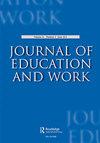Jockeying for position: university students’ employability constructions
IF 1.5
Q2 EDUCATION & EDUCATIONAL RESEARCH
引用次数: 0
Abstract
ABSTRACT As governments and international organisations have pressured universities to demonstrate the value and effectiveness of tertiary education, universities have started to highlight graduate employability as a key driver and measure of university outcomes. This paper contributes to the underutilised processual employability studies by applying the framework of critical discursive psychology to analyse university students’ employability construction. Following this framework, employability is something students do rather than something they have. The empirical study was based on interviews of Finnish students of social science. Analysis of the interviews demonstrated notable variation in the ways in which university students talk about their employability. While some students constructed their employability by positioning themselves as traditional bureaucrats, others constructed their employability by positioning themselves as entrepreneurial agents. Nevertheless, the central point is that some students related ambiguously to both positions and tried to manage the ideological dilemma between stability and security of the bureaucrat position, and variability and risk of the entrepreneurial position. The study calls for better understanding of ways in which students and graduates deal with the dilemmatic nature and requirements of the labour market.竞聘:大学生就业能力建设
摘要随着政府和国际组织向大学施压,要求其证明高等教育的价值和有效性,大学开始强调毕业生的就业能力是衡量大学成绩的关键驱动力。本文运用批判性话语心理学的框架来分析大学生的就业能力建设,为未充分利用的过程就业能力研究做出贡献。根据这个框架,就业能力是学生所做的,而不是他们所拥有的。这项实证研究基于对芬兰社会科学学生的采访。对访谈的分析表明,大学生谈论自己就业能力的方式存在显著差异。一些学生通过将自己定位为传统官僚来构建自己的就业能力,而另一些学生则通过将自身定位为创业代理人来构建他们的就业能力。然而,中心点是,一些学生对这两个职位都有模糊的联系,并试图处理官僚职位的稳定性和安全性与创业职位的可变性和风险之间的意识形态困境。这项研究呼吁更好地了解学生和毕业生如何应对劳动力市场的困境性质和要求。
本文章由计算机程序翻译,如有差异,请以英文原文为准。
求助全文
约1分钟内获得全文
求助全文
来源期刊

Journal of Education and Work
EDUCATION & EDUCATIONAL RESEARCH-
CiteScore
2.70
自引率
14.30%
发文量
40
期刊介绍:
The Journal of Education and Work is an international forum for academic research and policy analysis which focuses on the interplay of the education and economic systems. The journal examines how knowledge, skills, values and attitudes both about and for work and employment are developed within the education system. The journal also explores the various forms of industrial training and accreditation in the economic system, including changes in the economic and industrial infrastructure which influence the type of employees required. Work in the informal economy is also included.
 求助内容:
求助内容: 应助结果提醒方式:
应助结果提醒方式:


